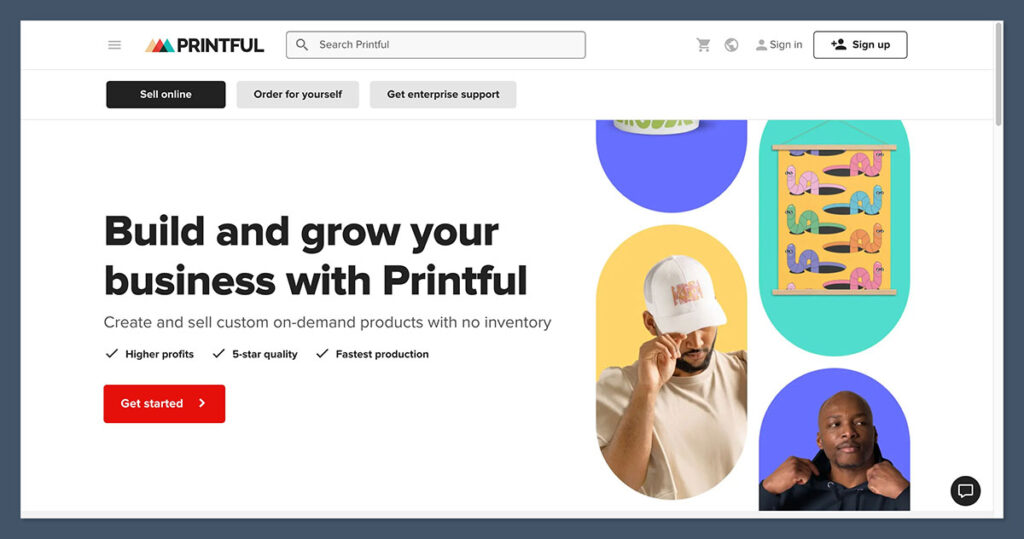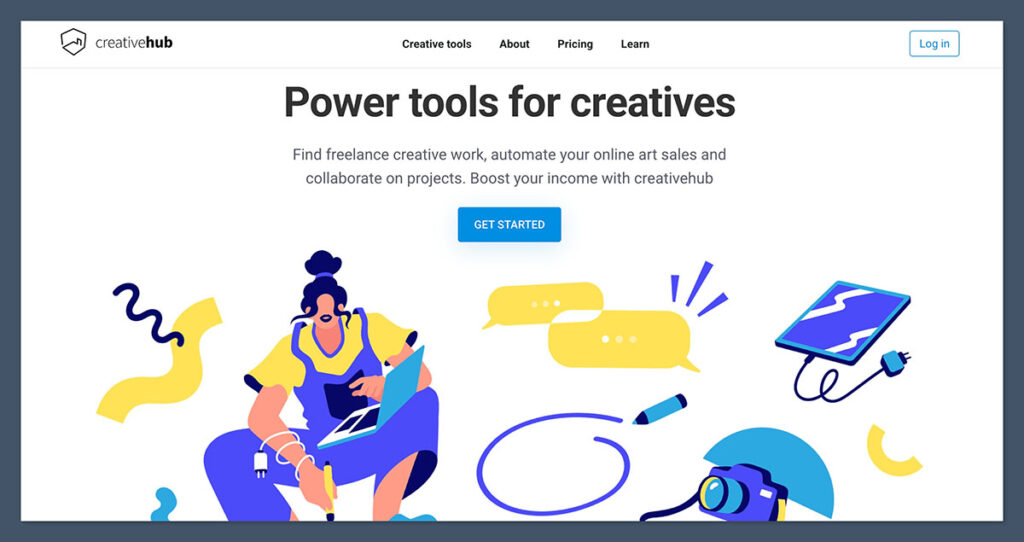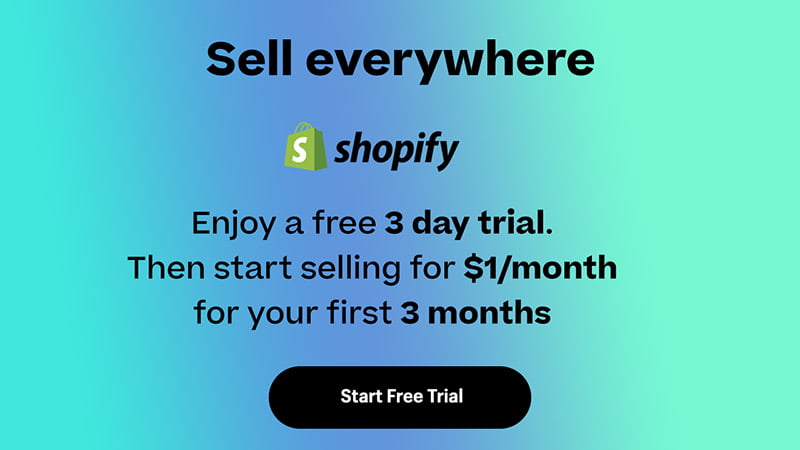Disclosure: We may earn a commission or fee from some of the links in our content. However, this does not affect our recommendations. Learn more.
CreativeHub and Printful are two major players in the print-on-demand space, but they’re built for very different sellers.
After testing both platforms extensively with real product setups, Shopify integrations, and live orders, I’ve compared how they stack up across product quality, shipping, profit margins, branding, and more.
If you’re selling art prints, CreativeHub might be your best bet.
But if you’re building a scalable ecommerce brand or testing multiple product types, Printful wins on features and fulfillment.
Let’s break it all down to help you make the right decision.
CreativeHub vs Printful: Quick Verdict
| Feature | Winner |
|---|---|
| Product Quality | CreativeHub (for fine art) |
| Product Variety | Printful |
| Global Shipping | Printful |
| Branding & Customization | Printful |
| Best for Artists | CreativeHub |
| Best for Scaling a Store | Printful |
| Shopify Integration | Tie |
| Profit Margins | Tie (depends on niche) |
My pick: If you want to sell high-end art prints, CreativeHub is unmatched in quality.
But for scalable ecommerce, Printful’s product range and global infrastructure make it the stronger choice.
At a Glance: CreativeHub vs Printful
Here’s how the two platforms compare side by side:
| Feature | CreativeHub | Printful |
|---|---|---|
| Product Range | Fine art prints only | 330+ products |
| Fulfillment Centers | UK only | USA, EU, Mexico, Australia, Japan |
| Shopify Integration | Yes | Yes |
| Etsy/Amazon Integration | No | Yes |
| Shipping Times | UK: 1–3 days | Global: 2–7 days |
| Branding Options | No branding | Custom labels, pack-ins |
| Design Tools | None | Mockup generator |
| Pricing | Based on paper, size | Fixed per item |
| Support | Email only | 24/7 chat, phone |
Best for Product Variety: Printful

Printful is a full-service print-on-demand provider offering over 330 customizable products, including:
- T-shirts
- Hoodies
- Mugs
- Wall art
- Swimwear
- Tote bags
- Hats
- Phone cases
- Home decor
These products are available for DTG (Direct-to-Garment), embroidery, sublimation, and all-over print.
You can set up a store with diverse collections and run product tests based on seasonal trends or influencer promotions.
CreativeHub Product Limitations
CreativeHub is built for one thing: gallery-quality giclée art prints.
This includes:
- Unframed giclée prints
- Framed prints
- Museum-grade papers (Hahnemühle, Canson)
That’s it. No t-shirts, mugs, or accessories. So while the quality is unmatched for fine art, you’re limited in terms of what you can sell.
Winner: Printful – better if you’re aiming for variety or volume.
Best for Shipping and Fulfillment: Printful
Printful has a global fulfillment network with locations in:
- United States (Charlotte, Los Angeles, Dallas)
- Mexico
- Canada
- Latvia (EU)
- Spain
- Australia
- Japan
This means faster delivery to a worldwide audience, fewer customs issues, and more predictable timelines.
Printful Fulfillment Timeline:
- Production time: 2–5 business days
- US delivery: 2–5 business days
- EU: 3–7 days
- Asia/Australia: 5–10 days
CreativeHub Fulfillment
CreativeHub prints everything in London, UK. While this is great for UK and EU buyers, it results in much slower shipping for US-based customers.
CreativeHub Fulfillment Timeline:
- Production: 1–3 days
- UK delivery: 1–3 days
- US/International: 7–14 days
Winner: Printful – their global footprint makes them a better option for international shipping and customer satisfaction.
Best for Artists: CreativeHub

CreativeHub is a go-to platform for artists, illustrators, and photographers who want to sell limited edition, high-end prints.
Why CreativeHub Wins for Art:
- Archival-quality giclée printing
- Gallery-grade paper stocks
- White-label fulfillment (no branding)
- Easy Shopify sync
- Higher perceived value (you can charge more)
Many artists using CreativeHub price their work at $50 to $200 per print depending on size and edition count.
If your brand is focused on art and you want buyers to see your prints as collectible items — not just decor — CreativeHub is built for that exact use case.
Winner: CreativeHub – perfect for fine art and photography prints.
Best for Branding: Printful
Printful gives you more tools to build a branded customer experience:
- Custom packaging slips
- Logo labels
- Return address with your brand
- Insert cards (you can ship these to Printful)
This is a huge win if you’re building a DTC brand or influencer store. Your packaging will feel on-brand, not generic.
CreativeHub, on the other hand, does not offer any branding options.
It’s completely white-label. That’s great for simplicity but limits your ability to build customer loyalty.
Winner: Printful – much better for brand presentation and repeat buyers.
Shopify Integration: Tie
Both CreativeHub and Printful offer direct integrations with Shopify.
CreativeHub Shopify Setup:
- Sync your art prints
- Set prices and margins
- Orders auto-fulfill
- No branding options
- UK-focused
Printful Shopify Setup:
- Sync any product from their library
- Add your own designs
- Custom branding
- Global shipping rates calculated
- Automated order fulfillment
Both setups are straightforward. CreativeHub is simpler, while Printful offers more control and features.
Winner: Tie – depends on your use case.
Etsy, Amazon, and Marketplace Support
If you’re selling on Etsy, Amazon, or TikTok Shop, Printful has native integrations for all of these platforms.
You can run multiple storefronts and let Printful handle the logistics across them.
CreativeHub only supports Shopify. That’s fine if you’re keeping things simple, but it’s a major limitation for multi-channel selling.
Winner: Printful – offers more flexibility and growth options.
Profit Margins: It Depends
This one’s a tie — but let me explain.
CreativeHub Margins
Art prints tend to carry higher perceived value, which means you can charge more:
- Print cost: $18
- Retail price: $60
- Shipping: $10
- Net profit: $32
Margins of 50%–60% are common, especially for artists with loyal followers or a strong social media presence.
That said, your margins will depend heavily on your branding and audience.
If you’re unknown and relying on organic traffic, it may be harder to justify high prices unless your designs have a strong niche appeal.
Printful Margins
Margins on clothing and accessories are thinner, but you can make it work at scale:
- T-shirt base cost: $13.95
- Retail price: $24.99
- Shipping: $3.99
- Net profit: $7.05
To increase margins, you’ll need to upsell, bundle, or use email marketing to drive repeat purchases.
High performers often run pre-order campaigns, influencer collaborations, or seasonal flash sales to drive volume.
Winner: Tie – CreativeHub wins for high-ticket prints, Printful wins at volume and variety.
Pricing Structure
Here’s a breakdown of what you’ll pay on both platforms.
CreativeHub Pricing
CreativeHub doesn’t charge monthly fees — you only pay for what you sell.
| Size | Estimated Cost (USD) |
|---|---|
| A4 (8.3 x 11.7 in) | $12–$15 |
| A3 (11.7 x 16.5 in) | $16–$20 |
| A2 (16.5 x 23.4 in) | $22–$30 |
| Framing | Adds $20–$40 |
Shipping:
- UK: $6–$10
- US: $15–$25
This pricing structure is ideal for artists who don’t want to commit to monthly overheads, especially when testing new designs or launching a new store.
Just be aware that larger prints and framing can add up quickly, so factor that into your pricing strategy.
Printful Pricing
Printful is also free to use — you only pay per item sold. Example base prices:
| Product | Fulfillment Cost |
|---|---|
| T-shirt | $13.95 |
| Hoodie | $24.95 |
| Poster | $9.99 |
| Mug | $7.95 |
Shipping:
- US: $3.99–$6.99
- International: Varies by product and location
While Printful’s product costs are fixed, the platform also offers volume discounts and premium plans (like Printful Pro), which give access to premium mockups, keyword research tools, and custom product templates.
If you’re selling high volumes, these upgrades may be worth the investment.
Winner: Tie – both are free to use but your profit margin depends on what you’re selling.
Customer Support
CreativeHub Support
- Email support only
- Help articles available
- No live chat or phone support
CreativeHub’s support is efficient for basic queries but doesn’t offer much real-time help.
If you run into technical issues or complex fulfillment problems, getting resolution can take a day or more.
Printful Support
- 24/7 live chat
- Email and phone support
- In-depth tutorials and onboarding
- Massive knowledge base
If you’re new to ecommerce or want fast answers, Printful gives you more support options.
Beyond support, Printful offers extensive training materials via Printful Academy.
You’ll find lessons on pricing, marketing, product photography, and niche selection — all useful for new store owners trying to get profitable faster.
Winner: Printful – better support, especially for beginners.
Design Tools and Mockups
Printful includes a built-in mockup generator to preview your designs on products.
You can also:
- Adjust placements
- Upload artwork
- Download product photos for your store
CreativeHub doesn’t offer a mockup generator. You’ll need to create your own visuals or hire a designer.
Printful also lets you generate lifestyle mockups, which show your products in realistic settings (e.g., someone wearing your hoodie or using your mug).
This makes your product listings feel more professional and can help boost conversions, especially on social platforms or marketplaces like Etsy.
Winner: Printful – easier for store setup and marketing.
Verdict: Which One Should You Use?
Here’s a summary of which platform is best depending on your goals:
| Use Case | Best Platform |
|---|---|
| Selling high-end art prints | CreativeHub |
| Selling t-shirts and merch | Printful |
| Fast global shipping | Printful |
| Custom branding | Printful |
| Minimalist artist store | CreativeHub |
| Growing a multi-product brand | Printful |
| Selling on Etsy or Amazon | Printful |
If you’re planning to sell across multiple channels or want more control over product diversity and branding, Printful is much more flexible.
Final Recommendation
If you’re an artist looking to sell professional-quality art prints with minimal hassle, CreativeHub is the obvious choice.
It’s simple, elegant, and built specifically for fine art.
But if you’re aiming to build a scalable ecommerce brand, expand your product range, and reach international customers, Printful gives you more tools, integrations, and long-term potential.
In the end, it really comes down to what you’re selling, where your customers are, and how much control you want over branding and fulfillment.
Both are free to start, so I recommend creating a test product on each platform and running a soft launch before committing to one long term.
Test both platforms for free and see what fits your vision.

